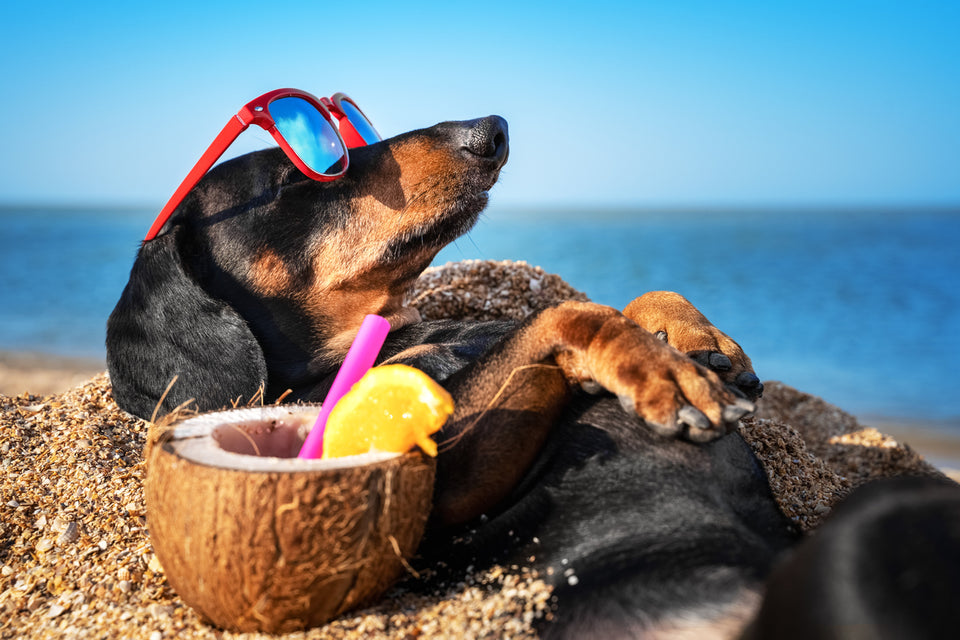
Do Dogs Need Sunscreen? A Pet Parent’s Guide to Dog Sun Protection

When the sun’s high and the heat’s on, you probably don’t head outside without wearing sunscreen. But what about your furry sidekick? Dogs need sun protection, too, and some dogs need it more than others. That’s why we’ve put together this guide on sunscreen for dogs, so you can know why they need it, which dogs need it most, and what kind of sunscreen is best for your fur bud.
Can Dogs Get Sunburn?
Dogs are just as prone to getting sunburned as humans, especially in areas that aren’t covered by fur, like the nose and inside the ears. Not only that, but dogs are also at risk for various types of skin cancer, including malignant melanomas. Sunburn in dogs can also worsen skin and autoimmune disorders.
Which Dog Breeds are At Risk for Sunburn?
Perhaps unsurprisingly, hairless breeds like the American hairless terrier, the Chinese crested and the Xoloitzcuintli are the most prone to getting sunburned. Dogs with white fur and dogs with thin coats or short hair also have less protection from their fur that makes them more vulnerable to sun damage.
Dogs with lighter pigment on their nose and ears are also more likely to get sunburned in those areas than dogs with dark pigment. Breeds with a higher risk include pit bulls, Dalmations, bulldogs and whippets. And some breeds, like Labrador retrievers and Siberian huskies, are prone to a condition called “snow nose” in which they lose pigmentation in their noses, causing them to turn pink. Despite the condition’s popular name, it can happen any time of year, placing your normally dark-nosed pooch at higher risk of a sunburned nose.
But keep in mind that “lower risk” doesn’t mean “no risk.” Any dog can get sunburned if they get too much sun exposure without any protection. If your fur pal likes to lounge on their back in the sunshine, their belly can get burned, no matter how thick or dark their fur or nose pigment may be. And many dogs experience hair loss that also leaves their skin exposed and unprotected.
Does Your Dog Need to Wear Sunscreen?
If your dog spends more than a few minutes in the sun, they should wear sunscreen wherever they’re vulnerable to sun damage. This includes the nose, ears, belly and any other place where they have thin hair or exposed skin.
What’s the Best Sunscreen for Dogs?
The best sunscreen for your sun-loving pup is one that’s made especially for dogs that has an SPF of at least 15. If you can’t find dog-safe sunscreen, you can use a broad-spectrum baby sunscreen, but you should first carefully read the label and stay away from these harmful ingredients:
- Zinc oxide
- PABA
- Salicylates
- Fragrance
When in doubt, check with your vet before using anything that’s made for humans on your dog.

What About Natural SPF Protection for Dogs?
If you’re concerned about other chemicals and ingredients found in sunscreen for dogs, you could try one of these natural DIY dog sunscreen options instead:
- Carrot seed oil - Cold-pressed carrot seed oil (not essential oil) has a natural SPF that averages around 35.
- Red raspberry seed oil - The oil from red raspberry seeds is SPF 20, and is also broad-spectrum.
The quality of each oil impacts the level of SPF, so use seed oils (again, not essential oils) that are cold-pressed, organic and unrefined. You can rub either oil directly into your dog’s skin, or you can combine them both together along with coconut oil (which also offers some sun protection, with a low SPF that maxes out at 7) for a shelf-stable, broad-spectrum homemade sunscreen that’s easy to apply.
Tips for Applying Sunscreen to Your Dog
Applying dog sunscreen might sound simple and straightforward, but following these best practices will help your fur bud get the most protection.
- Do a patch test - Before using sunscreen on your dog for the first time, first apply it to a small section and wait a while to see if it causes a skin reaction.
- Use your hands - Whether using an SPF lotion or a sun protector spray, put it on your hands first and rub it into your dog’s skin.
- Apply it liberally - Rub it into the nose and inner ears, the belly and groin, as well as any bald spots or places where the fur is too thin or short to provide adequate protection.
- Avoid the eyes - Take care not to get it into your dog’s eyes, or inside their nose, which could cause irritation.
- Let it soak in - Wait a few minutes before heading outside to give it time to absorb. You’ll want to watch them while you wait to make sure they don’t lick it or rub it off.
- Reapply it often - If you’re outside for a long time, you should reapply your pup’s sunscreen at least every couple of hours. If they’re swimming or splashing in water, you’ll need to reapply it when they get out of the water.

Protecting Your Dog from the Sun
Doggy sunscreen shouldn’t be your only line of defense against sun damage and heat. Your fur baby is in danger of overheating and heat stroke as much as they are from sunburn. And chances are, you don’t relish the thought of slathering greasy lotion all over your dog’s fur. Here are some additional steps you can take to protect your pooch from getting sunbaked:
- Use dog sun protection clothing. Dog sun shirts and suits provide coverage that will shield most of your pup’s body from harmful UVA and UVB rays. You can also get sun hats for dogs and doggy sun goggles to help shade and protect their eyes.
- Stay inside during peak sunshine hours. Except for quick trips outside to potty, either stay inside or stick to shaded areas from 10:00 AM to 4:00 PM during the summer months.
- Provide access to shade and water. If you do take your pup outside for an extended length of time during peak hours, make sure they’ve got plenty of water to drink, as well as a shady spot where they can escape the heat. A dog cooling blanket can also help keep them cool.
- Don’t shave your dog. If you’ve got a dog with thick fur, shaving them during the summer might seem like a good way to keep them from overheating, but that could compromise the natural sun protection provided by their fur and make them more susceptible to heat and sun damage. Instead, a sun-safe summer haircut for dogs can help them stay cool while keeping them protected.
Signs Your Dog is Sunburned
Sunburn on your dog might not be as obvious as it is in humans -- it may be hidden by fur or obscured by dark pigment. How can you tell if your dog is sunburned? Look for these tell-tale signs:
- Red or pink skin
- Skin that’s tender or warm to the touch
- Itchy skin
- Flaky or peeling skin
- Blistering
While you check your pup for sunburn, it’s also a good idea to look them over for moles, unusual freckling, lumps or bumps, which could indicate skin cancer. Have any out-of-the-ordinary bumps or marks on your dog’s skin examined by your vet as soon as you can.
How to Treat Dog Sunburn
If you see signs of dog sunburn, get your dog out of the sun as quickly as possible. You can use a cold compress, healing balm and aloe vera to provide immediate relief while you call your vet for advice. A burn that causes blisters will need to be treated by a vet ASAP. They’ll likely provide cortisone to reduce inflammation and provide pain relief, as well as antibiotics to treat infection that can result from severe sunburns.
Some dogs just can’t get enough sun, and they don’t know there’s such a thing as too much. That’s why it’s up to us as pet parents to protect our puppers and make it safe for them to enjoy their time in the sun.
Share this article
written by